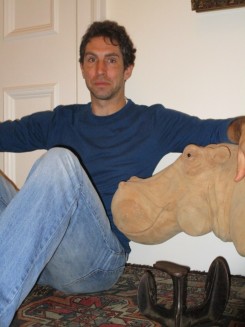Flaws of Nature: A guide to the outer reaches of evolution
Andy Dobson

Species evolve over time to become meticulously adapted to their environments, right?
Well, sometimes.
There remain some curious oversights. Consider that an elephant will not grow a seventh set of teeth, even though the wearing down of the sixth will condemn it to starvation; hosts of the European cuckoo seem unable to tell that the overgrown monster in their nests is an interloper; male mandarin ducks sport banner-like, predator-attracting, bright orange wing feathers for the purpose of attracting females – a task that the males of most other duck species achieve without any such impediment; and as for whales… Whales are fully aquatic mammals who, millions of years after first abandoning the land, still cannot breathe underwater.
This is a book about evolution, but not its Greatest Hits. Instead it’s an account of everything in the animal kingdom that is self-defeating, ill-made, uneconomical, and downright weird – and how natural selection has favoured it. In the grand struggle for survival, some surprising patterns emerge: animals are always slightly out-of-date; inefficiency tends to increase over time; predators usually lose, and parasites usually win. Flaws of Nature is here to explain how and why.
Drawing on scientific research in topics from ecology and palaeontology to sexual selection and genetics, this book takes the reader on the little-travelled journey of evolutionary eccentricities. A wealth of colourful case-studies show how natural selection involves trade-offs, compromises, and botch-jobs, sacrificing individuals in favour of their genes, pitting male against female and parent against offspring, and all the while humming with boundless, beautiful, extravagant waste.
Book Details:
- Author: Andy Dobson
- On Submission
-
Rights Sold
- UK: The History Press
- Korea: Content Group Forest Corp.
- China: Beijing Science and Technology Publishing Co
- China: Walkers Cultural Enterprise Ltd
- Saudi Arabia: Sumo
- Russian: Alpina

Andy Dobson
Dr Andy Dobson is a research biologist whose papers have been cited well over 1000 times in the academic literature. After a first-class degree in Ecology from Durham, Andy completed a PhD on the ecology of hen harriers at Nottingham University, before joining the University of Oxford’s Zoology Department. At Oxford he developed an interest in epidemiology, and used mathematical modelling to predict changes in the risk of Lyme disease and other tick-borne infections. During a later fellowship at Stirling University, Andy turned his attention to host-parasite interactions, and used sim...
More about Andy Dobson